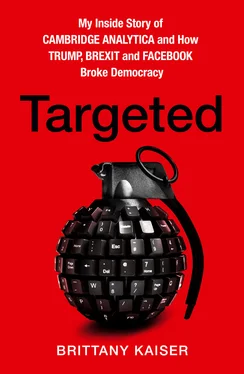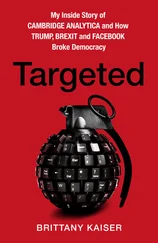1 ...7 8 9 11 12 13 ...17 I knew that working for Cambridge Analytica was going to cause a sea change in my life. At the time, I believed that what I was about to do would give me a chance to see up close how the other side worked, to have greater compassion for people, and the ability to work with those with whom I disagreed.
This was what was in my head when I said yes to Alexander Nix. Those were my hopes when I crossed over to investigate the other side.
3 3 Power in Nigeria 4 Davos 5 Terms and Conditions 6 Meetings and Reunions 7 The Face of Brexit 8 Facebook 9 Persuasion 10 Under the Influence 11 Brexit Brittany 12 Straitjacket 13 Postmortem 14 Bombs 15 Quake 16 Breakup 17 Inquiry 18 Restart 19 Of Truth and Consequences 20 The Road to Redemption Epilogue Picture Section Acknowledgments Notes About the Publisher
Power in Nigeria 3 Power in Nigeria 4 Davos 5 Terms and Conditions 6 Meetings and Reunions 7 The Face of Brexit 8 Facebook 9 Persuasion 10 Under the Influence 11 Brexit Brittany 12 Straitjacket 13 Postmortem 14 Bombs 15 Quake 16 Breakup 17 Inquiry 18 Restart 19 Of Truth and Consequences 20 The Road to Redemption Epilogue Picture Section Acknowledgments Notes About the Publisher
DECEMBER 2014
SCL was made up of ten to fifteen full-time employees—some British, some Canadian, an Australian, three Lithuanians, and an Israeli among them—and I made my rounds to meet them and learn a little more. Each was my age or a bit older, most with master’s degrees, but also many with PhDs. All had already amassed impressive experience working in the for-profit and nonprofit worlds, in everything from banking to high-tech to the oil and gas industry to running humanitarian programs across Africa.
They had come to the company because it offered them the unique opportunity to work at a place in Europe that had the feel of a Silicon Valley start-up. They were supremely hardworking and serious. Their tone was subdued and professional, with an undercurrent of urgency that, though quiet, seemed more characteristically New York than London. They worked long hours and gave 200 percent of themselves. Some had been embedded in the recent American election campaigns and had just returned to the London office to a hero’s welcome. They’d been living for a year in offices in Oregon and North Carolina and Colorado, where the most contested races had been. Those who’d stayed behind in London had worked just as hard, as experts on the countries where the SCL Group also did business.
Each of my colleagues possessed highly specialized skill sets that gave him or her very specific roles in the company.
Kieran, the director of communications, whom I had met during my interview, did everything from political party branding to global messaging strategy. His list of advertising awards was impressive, and his work in corporate branding was better than most I had seen. After Alexander, he’d been with the company the longest, and he showed me a thirty-strong shelf of political party manifestos and platforms SCL had written and he’d designed.
Though with the company for only a few years, Peregrine Willoughby-Brown—Pere, for short; pronounced “Perry”—a Canadian, had already worked in multiple countries, handling elections, running focus groups, gathering data, and organizing locals. He had recently been in Ghana, working on the enormous public health project Alexander had told me about. Pere helped orient me to what it was like to be embedded in foreign campaigns in places other than the United States. In developing nations, logistics could be a nightmare. Even getting access to certain regions was difficult; roads could be washed out or nonexistent. But most problems, he said with a grin, were with people, such as when local pollsters and canvassers didn’t show up or simply blew off their jobs after a first paycheck.
Jordan Kleiner was a jovial Brit with an enormous peacock tattoo on his chest. His job was to make sense of the company’s research and serve as liaison between the research team and the communications and operations teams. He also acted as a kind of bridge between the data people and the creatives, and he knew how to translate research into effective copy and images.
To a new person on the inside, the team comprised big thinkers and problem solvers who were politically liberal and who, in the early winter of 2014, didn’t seem terribly bothered by the fact that the company had taken on conservative clients—in part, I think, because they hadn’t gotten in too deep yet. The American midterms had introduced them to hawks and eccentrics, but it might have been possible for them to think of the latter as one-offs, and the company was only just beginning to secure contracts for the Republican primaries.
At the time, the mood in the office was cheerful, the camaraderie strong, and the members of the group uncompetitive with one another, as there were so few of them and their jobs didn’t overlap too often.
The SCL and Cambridge Analytica staff were energized by Alexander’s vision. The opportunity open to them was the equivalent of that at Facebook in the early days, and it hadn’t taken Facebook too many years to go public to the tune of an $18 billion valuation. Alexander wanted a similar outcome, and as Millennials, the staff looked to Mark Zuckerberg’s baby as a model of remarkable innovation in spaces no one had even thought to occupy until the company came along.
Cambridge Analytica was based on the same idealistic notion of “connectivity” and “engagement” that had fueled Facebook. The company’s raison d’être was to boost engagement in uncharted territory, and those who worked there clearly believed, as those at Facebook had, that they were building something real that the world simply didn’t yet know it couldn’t do without.
Alexander occupied one glass boxat the front of the office, and the data scientists occupied one at the back. Theirs was filled with computer stations where the company’s small team of scientists were glued to multiple screens.
Some were eccentric and kept to themselves. One, a Romanian with dark brown eyes, looked up from his work only from time to time. His specialty was research design; he could break up a country into regions and make statistically accurate samples of populations others could use to identify target audiences. Another Lithuanian, who dressed like a posh Brit, often coming to work in a smoking jacket, specialized in data collection and strategy.
The two codirectors of Data Analytics were Dr. Alexander Tayler, a taciturn, ginger-haired Australian, and Dr. Jack Gillett, a dark-haired, friendly Englishman. Tayler and Gillett had been classmates at Cambridge University and, after graduation, each had spent a few years as cogs in the wheels of larger outfits—Gillett at the Royal Bank of Scotland and Tayler at Schlumberger, an oil field services company. Both had come to SCL for the opportunity to design cutting-edge data programs and run their own shop.
Tayler and Gillett had at their disposal a robust but supple database that gave the company a great advantage whenever it had to run a new political campaign. Usually, every time a campaign begins, those in charge of data have to build a database from scratch or buy a database from a vendor. SCL’s database was its own, and it could buy more and more data sets and model those data points more accurately with each client project. While I would later learn the true cost of this “advantage,” and the legal wrangling it took to convince clients to share their data with SCL permanently, for now it seemed to me an incredibly benign and powerful tool.
On the first Obama campaign, we’d had no advanced predictive analytics at all. In the six intervening years, things had changed so much. Alexander said that data was an incredible “natural resource.” It was the “new oil,” available in vast quantities, and Cambridge Analytica was on track to become the largest and most influential data and analytics firm in the world. It was an unprecedented opportunity for those with an adventurous, entrepreneurial spirit. There were claims to be staked, data to mine. And it was a honeymoon period in a completely new industry. It was the equivalent, Alexander said, of the “Wild West.”
Читать дальше












